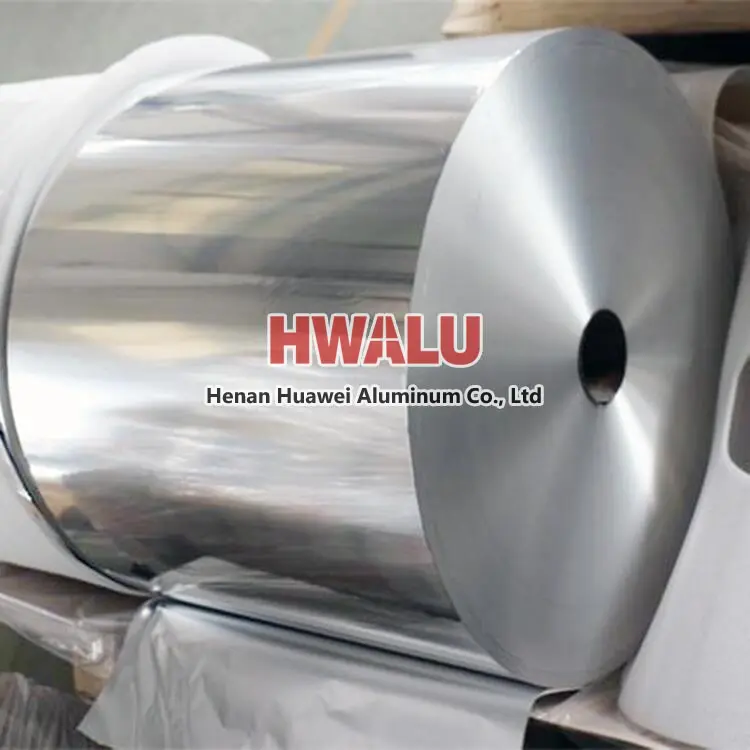so What is Aluminum foil grade 1235? 1235 Alloy Aluminum Foil is an aluminum alloy material commonly used in the packaging industry. It is as high as 99.35% pure, has good flexibility and ductility, and also has good electrical and thermal conductivity. The surface is coated or painted to increase its resistance to corrosion and abrasion. 1235 Alloy Aluminum Foil is widely used in food packaging, pharmaceu ...
What is Aluminum Foil for Pans? Aluminum foil for pans is a type of aluminum foil specially used for cooking, and it is usually thicker and stronger than ordinary household aluminum foil, and has better heat resistance properties. It is often used to cover the bottom or sides of pans to prevent food from sticking to or scorching, while also helping to maintain moisture and nutrients in food. Aluminium foil ...
Air conditioner aluminum foil Air-conditioning is indispensable to escape the heat in summer. As air-conditioning enters thousands of households, it is also constantly developing. At present, air conditioners are gradually developing in the direction of miniaturization, high efficiency, and long life. The air-conditioning heat exchange fins are also correspondingly developed in the direction of ultra-thin and hi ...
What is aluminum foil for cake cup? Aluminum foil can be used for many purposes in baking, such as making cupcake cups or liners. Aluminum foil cake cups are cup-shaped containers used for baking cakes, cupcakes, or cupcakes, usually made of aluminum foil. Cake cup aluminum foil is used to wrap the bottom and sides of the cake cup to maintain the shape of the cake when baking, prevent sticking, and make the ca ...
Pharmaceutical easy-tear aluminum strip foil Pharmaceutical easy-tear aluminum strip foil is a common pharmaceutical packaging material, usually used to package pharmaceuticals such as oral tablets and capsules. It has the advantages of easy tearing, good sealing, moisture resistance, and oxidation resistance, which can effectively protect the quality and safety of medicines. Pharmaceutical easy-tear aluminum ...
What is aluminum foil for induction Aluminum foil for induction is a special aluminium foil material with the function of electromagnetic induction heating. It is commonly used to seal the lids of bottles, jars or other containers for sterile, airtight packaging. In addition, aluminium foil for sensing also has the advantages of easy operation, high efficiency and environmental protection. The working princi ...
Aluminum foil jumbo roll: Ideal for cooking or baking large dishes such as roasts, turkeys or baked cakes as it covers the entire dish with ease. Ideal for wrapping leftovers or storing food in the freezer, as you can cut the desired length of foil as needed. Aluminum foil jumbo rolls can last for a long time, which can save costs in long-term use. Small rolls of aluminum foil: More portable an ...
Aluminum foil is a good heat insulator because it is a poor conductor of heat. Heat can only be transferred through a material by conduction, convection, or radiation. In the case of aluminum foil, heat transfer occurs primarily through radiation, which is the emission of electromagnetic waves from the surface of an object. Aluminum foil is a shiny, reflective material that reflects radiant heat back towards i ...
https://www.youtube.com/watch?v=ZR_JvbVongU The shocking statistics released by the National Center for Cardiovascular Diseases suggest that China has the highest occurrence of sudden cardiac deaths (SCD) in the world, accounting for over 544,000 deaths annually. That is to say, SCDs occur at a rate of 1,500 people/day or one person/minute in China. According to David Jin, general manager of Henan Huawei Alumi ...
How thick is aluminum foil? Understanding of aluminum foil What is aluminium foil? Aluminum foil is a hot stamping material that is directly rolled into thin sheets with metal aluminum. It has a very thin thickness. Aluminum foil is also called fake silver foil because its hot stamping effect is similar to that of pure silver foil. Aluminum foil has many excellent properties, including soft texture, good duct ...
Aluminum foil plays a vital role in the construction of lithium-ion batteries. There are many models in the 1000-8000 series alloys that can be used in battery production. Pure aluminum foil: Pure aluminum foil commonly used in lithium batteries includes various alloy grades such as 1060, 1050, 1145, and 1235. These foils are usually in different states such as O, H14, H18, H24, H22. Especially alloy 1145. ...
Aluminum foil is a good packaging material and can be used for food packaging and pharmaceutical packaging. It can also be used as a conductive material. As a conductive material, aluminum foil has many advantages compared with other metals. What is the difference in conductivity between aluminum foil and other metals? This article will describe how aluminum foil conducts electricity compared to other metals. ...










